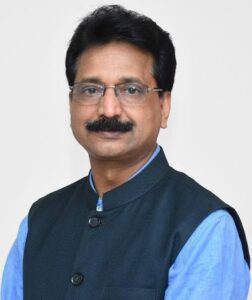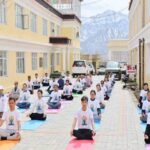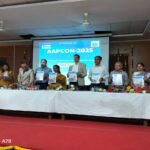India
healthysoch
Bhubaneswar / New Delhi, April 06, 2025:
 Professor Vaidya Rabinarayan Acharya, Director General of the Central Council for Research in Ayurvedic Sciences (CCRAS), has been conferred with the Doctor of Science (D.Sc.) degree by Utkal University, Bhubaneswar — the highest academic honour for research in India.
Professor Vaidya Rabinarayan Acharya, Director General of the Central Council for Research in Ayurvedic Sciences (CCRAS), has been conferred with the Doctor of Science (D.Sc.) degree by Utkal University, Bhubaneswar — the highest academic honour for research in India.
The degree was awarded in recognition of his extensive research on ethnomedicinal plants of the Gandhamardan Hills in Odisha and their relevance to the Ayurvedic Pharmacopoeia. His thesis, titled “Phyto-Pharmacognostical and Biological Evaluation of Certain Extra-Pharmacopoeial Plants (Anukta Dravya) of Ayurveda Available in Odisha”, explored lesser-known medicinal plants and their potential for integration into mainstream Ayurveda.
With this recognition, Prof Acharya becomes the first individual in India to be awarded a D.Sc. in Ayurveda, specifically in the discipline of Dravyaguna (Ayurvedic Pharmacology).
“This degree is not just a personal milestone but a step forward in preserving and scientifically validating our traditional knowledge systems,” said Prof Acharya, acknowledging the role of his mentors and collaborators.
The work was commended by several eminent scholars including Prof Ravi Rao S (Karnataka Ayurveda Medical College), Prof B.S. Prasad (NCISM), and academics from the University of Colombo, Sri Lanka.
A native of Jagatsinghpur district in Odisha, Prof Acharya has served as DG of CCRAS since February 2022. He has over three decades of experience in teaching and drug research, with prior appointments including Professor and Dean at the Institute of Teaching and Research in Ayurveda (ITRA), Jamnagar.
He has authored over 400 peer-reviewed research papers, five books, three monographs, and 12 book chapters. His contributions also include a patent, academic writing for IGNOU, and advisory roles with the World Health Organization (WHO), where he served on expert panels concerning herb-drug interactions, pharmacovigilance, and traditional medicine.
Prof Acharya has represented India in 11 countries at various international forums, furthering global engagement in traditional medicine research and policy.






